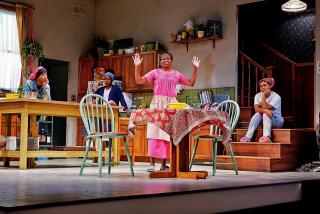‘Ballyhoo’ Emerges as a Powerful Southern Family Drama
- Share via
NEW YORK — At the start of Alfred Uhry’s achingly beautiful play “The Last Night of Ballyhoo,” a young woman announces she is working on a novel. According to dramatic convention, that would make her the play’s heroine. She’s not. However conventional this essentially one-set Southern family drama may look on the surface, the play, set in 1939 Atlanta, is in fact surprising, luminous and powerful. It will most likely find a place in the American canon alongside Uhry’s only other non-musical play, “Driving Miss Daisy.” “Ballyhoo” opened Thursday night at the Helen Hayes Theatre on Broadway.
The would-be novelist is Lala, who lives in her Uncle Adolph’s house in Atlanta along with her mother and aunt, both of whom are widows. In an affecting performance by Jessica Hecht, Lala is a desperate soul, an aggressive Laura Wingfield. Instead of tending to little glass animals, Lala is woefully in thrall to “Gone With the Wind,” the film premiere of which is happening in town the night of the first scene. Having fled the social terrors of college, Lala ran home, where her emotional stability and marriageable status are sternly monitored by her mother, Boo, whose genius for meanness is expertly mined by actress Dana Ivey. Together, mother and daughter enter into a wretched assessment of Lala’s worth that is one of the play’s most harrowing elements.
Lala tries out Scarlett O’Hara’s recipe for success--a breathy coquettishness--on an embarrassed young gentleman caller named Joe (Paul Rudd), whom Uncle Adolph brings home from the family’s bedding company. Joe is astounded by the Christmas tree the family keeps; they are long-ago assimilated German Jews, while he is from proudly Jewish Eastern European stock. His presence, and the headlines from Germany and Poland, force the family to confront prejudices they had never bothered to examine.
Uhry makes it quite clear--too clear, in fact--that he sees their lack of Jewishness as a terrible emptiness, a hole in the family’s identity. He even goes so far as to suggest--in an entirely unneeded and treacly coda--that religion will be a panacea to correct all of this family’s complicated and fascinating woes.
But Uhry’s real strength shines throughout the rest of the play, in the jealousies and disappointments that drive family life. Under Ron Lagomarsino’s sensitive direction, the central conflict is not between a family and its fear of Jewishness, but between a troubled girl who can do nothing right and her cousin, a young woman who knows herself and faces life on firm ground. Appropriately, she is named Sunny (Arija Bareikis), and she is home from college for the holidays, also a time for the social event of the Jewish season, a prom known as the Last Night of Ballyhoo.
To Lala, Sunny is a recurring symbol of all her failures. She is the apple of Uncle Adolph’s eye and enjoys an unclouded, inherently supportive connection with her own, sweetly dizzy mother (played wonderfully by Celia Weston). This divided household goes into full swing as the two young women prepare for Ballyhoo. Their dates reflect the paths where their own judgment has led them, for good or ill. The audience seems to hold its breath as they descend the staircase in their dresses, a study in contrast.
The play is not perfect. Despite Rudd’s terrific performance, Joe is a generic, good young man. Uncle Adolph (Terry Beaver) offers a thin explanation of his bachelor status, which is wisely filled in with the slightest suggestion of repressed homosexuality by the actor. But these flaws, and the proselytizing coda, cannot take away from the achievement of this play. For the better part, Uhry draws his characters with so fine a pen, on such a solid foundation, that the story takes on the sharp poignancy of life.
There’s a searing moment when Lala berates Sunny with the full force of her bitterness for having a father whose funeral drew crowds of people where her own father’s drew almost none. When this sad young woman wails at life’s unfairness, one senses her cry will echo far into the future of American drama.
* “The Last Night of Ballyhoo,” Helen Hayes Theatre, 240 W. 44th St., New York, (800) 755-4000.
More to Read
The biggest entertainment stories
Get our big stories about Hollywood, film, television, music, arts, culture and more right in your inbox as soon as they publish.
You may occasionally receive promotional content from the Los Angeles Times.










